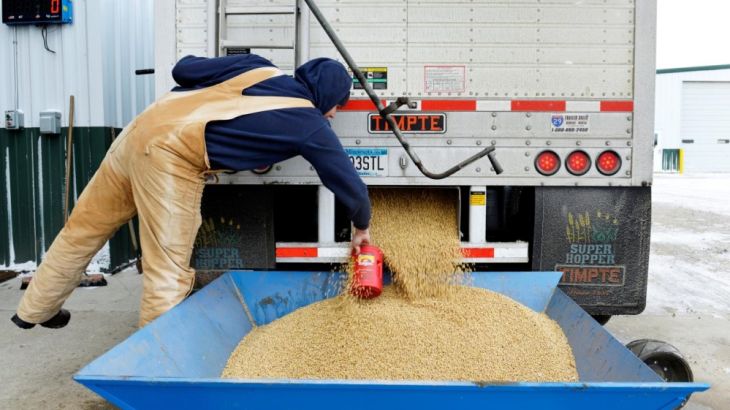China imposes 25 percent tariffs on key US exports
Still unclear when penalties will be imposed, but finance ministry closely watching how US will implement its actions.

China has retaliated quickly against proposed United States penalties on Chinese goods and announced 25 percent tariffs on critical American exports, including soya beans, aeroplanes and cars.
On Tuesday, the administration of President Donald Trump threatened to slap tariffs on $50bn in Chinese imports across 1,300 categories of products, ranging from industrial robots to locomotives.
Keep reading
list of 4 itemsChina’s economy beats expectations, growing 5.3 percent in first quarter
Inside the pressures facing Quebec’s billion-dollar maple syrup industry
Manipur’s BJP CM inflamed conflict: Assam Rifles report on India violence
Beijing’s response came hours after the US revealed its plans, with China’s foreign ministry saying in a statement that “America’s measures to impose tariffs have violated the rules of the World Trade Organisation, and have seriously violated China’s legal rights”.
Soya beans are the top US agricultural export to China and were among the 106 products on which China intends to impose the additional tariffs.
The US is the second-biggest soya bean supplier to China, after Brazil.
Neither the US nor the Chinese tariffs will take effect immediately.
The Chinese government did not specify when its penalties would be imposed, but the Chinese finance ministry said that the authorities are closely watching how the US will implement its actions.
The tariffs may never even be imposed if the two sides eventually agree on a deal to open further China to US imports.
US companies have until May 22 to raise objections and a public hearing is scheduled for May 15 in Washington, DC.
It may thus take until the end of May or early June for the tariffs to come into force.
The latest round of tariff threats is in addition to the recently imposed 25 percent tariffs on Chinese steel and 10 percent on aluminium.
Japan was also hit with these tariffs, while most countries got a temporary exemption.
To the steel and aluminium tariff, China retaliated with its own duties on around $3bn of US agricultural goods in that dispute.
The Chinese embassy in Washington, DC, said in a statement that “such unilateralistic and protectionist action has gravely violated fundamental principles and values of the WTO. It serves neither China’s interest, even less, the interest of the global economy”.
Intellectual property theft
Last year, the US ran a $375bn trade deficit with China, which Trump wants to see reduced by $100bn.
“We intend to get along with China, but we have to do something very substantial about the trade deficit,” Trump said on Tuesday.
The tit-for-tat measures raise concerns of a full-blown trade war and the news of Chinese retaliation has already shaken markets.
Dow Jones Industrial Averaged plunged by 500 points, or more than two percent, on Wednesday morning.
Al Jazeera’s Gabriel Elizondo, reporting from New York City, said that an “opening trade war” is behind the drop in stocks on Wall Street, noting that major companies such as Boeing could be affected.
“Wall Street does not like uncertainty, and that’s certainly what they’re seeing,” Elizondo said.
“People are worried. These are the two biggest economies in the world – $650bn is traded just between the US and China, so there’s a lot at stake there.
“The roughly $50bn in tariffs that were announced by each side, that in of itself will not bring down the global economy – most analysts say – but it’s a foreshadowing of more tariffs that could, and that’s the real problem here. A lot of people are saying this affects many big companies on the New York stock exchange and that’s why so many people are worried.”
Wednesday’s announcement also prompted European stocks to extend losses, with The Stoxx Europe 600 sliding 1.2 percent.
Most Asian stocks also fell.
The Chinese yuan also suffered its biggest daily fall against the dollar in two weeks after the measures were proposed. The currency fell 0.4 percent against the dollar.
The US tariff move follows the release of the results of an investigation into China’s intellectual property practices that Trump ordered last year.
Trump pointed to the alleged theft of intellectual property by China that he said is “probably in the neighbourhood of $200 to $300bn”.
The US Trade Representative’s office said that the size of the tariffs against the Chinese economy “is commensurate with an economic analysis of the harm caused by China’s unreasonable technology transfer policies to the US economy”.
The US worries that China is involved in cyberespionage and unfair government subsidisation that is helping China advance in technology.
China denies that it engages in unfair or illegal activities.
The trade war has worried American farmers, particularly producers of goods such as soya beans.
The tariffs can make the agricultural equipment and inputs that farmers rely on, more expensive.
US business groups have called on the Trump administration to rethink its plan for tariffs, arguing that the plan amounted to new taxes on US consumers and businesses.